
Critical Criminology
Scope & Guideline
Challenging Perspectives, Transforming Justice.
Introduction
Aims and Scopes
- Critical Examination of Power Structures:
The journal focuses on how power dynamics influence the construction of crime and the functioning of the criminal justice system, exploring the roles of race, class, gender, and other social categories. - Interdisciplinary Approaches:
It welcomes contributions from various disciplines, including sociology, law, political science, and cultural studies, promoting a comprehensive understanding of criminological issues. - Focus on Marginalized Communities:
The journal emphasizes the experiences and perspectives of marginalized and oppressed populations, particularly in relation to crime, punishment, and social justice. - Engagement with Contemporary Issues:
Critical Criminology addresses pressing societal issues such as immigration, drug policy, environmental harms, and the impacts of neoliberalism on justice systems. - Advocacy for Social Justice:
The journal advocates for transformative justice practices and critiques punitive approaches, emphasizing the need for systemic change and abolitionist perspectives.
Trending and Emerging
- Crimmigration and the Criminalization of Migration:
There is a growing focus on the intersections of immigration and criminal justice, exploring how migration policies create new forms of criminalization and social control. - Environmental and Green Criminology:
Emerging discussions around ecological harms and their intersection with crime highlight the importance of understanding environmental issues as critical criminological concerns. - Digital and Cyber Criminology:
Research addressing the implications of digital technology on crime, surveillance, and social control is gaining traction, reflecting contemporary concerns about privacy and data policing. - Intersectional Analysis of Social Justice:
An increase in intersectional approaches that examine how various social identities (race, gender, sexuality) intersect to produce unique experiences of crime and victimization. - Feminist and Queer Criminology:
There is a notable rise in feminist and queer perspectives within criminology, addressing issues related to gendered violence, LGBTQ+ victimization, and the role of gender in the criminal justice system.
Declining or Waning
- Traditional Theoretical Frameworks:
There has been a noticeable decline in the emphasis on classical criminological theories, as the journal increasingly prioritizes contemporary and critical perspectives that challenge established norms. - Focus on Individual Criminal Behavior:
Research centered on individualistic explanations for crime, such as psychological or biological determinism, appears to be waning in favor of structural and contextual analyses of crime. - Conventional Law Enforcement Perspectives:
The journal's focus on traditional law enforcement practices is decreasing, as it shifts towards critical examinations of policing and state violence, emphasizing the need for reform. - Generalized Crime Statistics:
There is less emphasis on the use of generalized crime statistics without context, as the journal increasingly values qualitative and intersectional approaches that highlight lived experiences. - Rehabilitation and Reintegration Models:
The discussion around rehabilitation and reintegration is diminishing, as the journal leans more towards abolitionist frameworks that critique the efficacy of these models within punitive systems.
Similar Journals
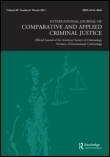
International Journal of Comparative and Applied Criminal Justice
Bridging disciplines for a just tomorrow.International Journal of Comparative and Applied Criminal Justice, published by ROUTLEDGE JOURNALS, TAYLOR & FRANCIS LTD, stands at the forefront of interdisciplinary research in the fields of law, sociology, and social psychology. With an ISSN of 0192-4036 and an E-ISSN of 2157-6475, this esteemed journal has been disseminating pivotal research since its inception in 1977. Recognized for its rigorous scholarship, it boasts a Q1 ranking in Law and positions itself within the top 85th percentile in Social Sciences - Law, emphasizing its impact on the academic community. Although primarily subscription-based, its accessibility ensures that critical findings reach a wide audience, supporting the advancement of knowledge across various disciplines. The journal's scope encompasses significant developments in applied criminal justice, making it an invaluable resource for researchers, policymakers, and students dedicated to understanding and improving justice systems globally. In its commitment to academic excellence, the journal continues to foster innovative dialogue and promote knowledge exchange, contributing significantly to current debates within the social sciences.

CRIMINAL JUSTICE STUDIES
Advancing the discourse in criminal justice.CRIMINAL JUSTICE STUDIES, published by Routledge Journals, Taylor & Francis Ltd, is a leading journal in the field of criminal justice and law, boasting an impressive 2023 Q1 category ranking. With an ISSN of 1478-601X and an E-ISSN of 1478-6028, this journal serves as a pivotal platform for disseminating high-quality research that spans various dimensions of criminal justice, including policy, theory, and practice. Since its inception in 2007, CRIMINAL JUSTICE STUDIES has become a vital resource for scholars, practitioners, and students, addressing contemporary challenges and developments within the field. With a remarkable Scopus rank of #157 out of 1025 in Law, positioning it within the 84th percentile, this journal is dedicated to advancing knowledge and fostering critical discourse. Although it does not offer open access, the insights shared within its pages are invaluable to those seeking to deepen their understanding of criminal justice systems worldwide. Based in the United Kingdom and running through 2024, CRIMINAL JUSTICE STUDIES is essential for those engaged in research and practice, pushing the boundaries of knowledge and contributing to the evolution of criminal justice scholarship.
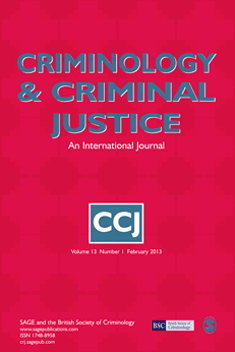
Criminology & Criminal Justice
Exploring Innovative Solutions in Crime and JusticeCriminology & Criminal Justice is a leading academic journal published by SAGE Publications Ltd that serves as an essential resource for scholars, practitioners, and students in the field of criminology and legal studies. With its ISSN 1748-8958 and E-ISSN 1748-8966, this journal has established itself as a crucial platform for innovative research, analysis, and discourse, consistently maintaining a prestigious Q1 ranking in Law. Spanning a diverse range of topics within criminology and criminal justice, it promotes interdisciplinary perspectives that reflect current trends and challenges within the domain. With a notable 93rd percentile ranking in Scopus, the journal ensures that its publications meet rigorous academic standards, fostering the advancement of knowledge and practice in the field. Based in the United Kingdom and catering to a global audience, this journal enhances scholarly communication and collaboration, making it an indispensable tool for those dedicated to unraveling the complexities of crime and justice.

Journal of Penal Law and Criminology-Ceza Hukuku ve Kriminoloji Dergisi
Unlocking Knowledge in Criminal JusticeThe Journal of Penal Law and Criminology-Ceza Hukuku ve Kriminoloji Dergisi, published by ISTANBUL UNIV, is a prestigious platform dedicated to the advancement of knowledge in the fields of criminal law and criminology. With its Open Access policy adopted since 2017, it aims to promote the dissemination of research findings and theoretical discussions, ensuring that vital insights in criminal justice, legal reforms, and criminological studies are accessible to a global audience. This journal serves as a vital resource for academics, legal practitioners, and students alike, fostering interdisciplinary dialogue and encouraging innovative research. By focusing on contemporary issues in penal law and criminology, the journal enhances understanding and addresses the complexities of justice in a rapidly changing society. With an ISSN of 2148-6646 and an E-ISSN of 2602-3911, it continuously strives to maintain high scholarly standards and relevance in its contributions to the field.
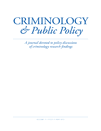
Criminology & Public Policy
Exploring the Nexus of Crime and GovernanceCriminology & Public Policy, published by Wiley, is an esteemed journal that plays a pivotal role in the interdisciplinary fields of law, public administration, and literature. With a focus on innovation and empirical research, this journal addresses critical issues surrounding crime and justice while influencing policy decisions globally. The journal boasts a prestigious impact factor, reflecting its significant contribution to academic discourse, particularly noted for its top quartile rankings in the fields of Law, Literature and Literary Theory, and Public Administration in 2023. As a resource for researchers, practitioners, and policymakers, Criminology & Public Policy aims to bridge the gap between theory and practical application, presenting cutting-edge analyses and insights that are vital for addressing contemporary societal challenges. By providing a platform for rigorous scholarship, this journal supports the advancement of knowledge and fosters informed discussions that shape effective public policies.
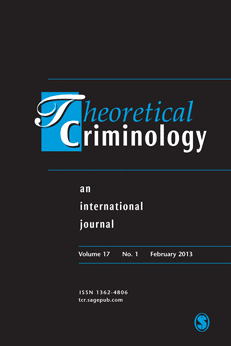
THEORETICAL CRIMINOLOGY
Advancing Insight into Law and SocietyTHEORETICAL CRIMINOLOGY is a premier academic journal published by SAGE PUBLICATIONS LTD that serves as a vital platform for the dissemination of cutting-edge research in the realms of law, sociology, and forensic medicine. Established in 1997 and converging into a comprehensive resource through 2024, this journal has achieved a remarkable reputation with a 2023 Q1 ranking in Law as well as in Sociology and Political Science, underscoring its influential contributions to these disciplines. Situated in the United Kingdom, it is recognized for its rigorous peer-reviewed content and holds prestigious positions in Scopus rankings, including Rank #34 in Social Sciences - Law and Rank #38 in Medicine - Pathology and Forensic Medicine, reflecting its commitment to academic excellence. Although it does not currently offer open access options, the journal ensures that its articles are accessible through institutional subscriptions, making it an indispensable resource for researchers, professionals, and students aiming to deepen their understanding of theoretical frameworks and contemporary issues in criminology.
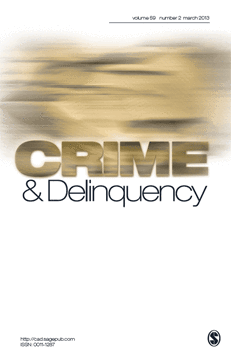
CRIME & DELINQUENCY
Shaping the future of criminal justice scholarship.CRIME & DELINQUENCY, published by SAGE PUBLICATIONS INC, is a premier journal dedicated to advancing the study of criminology and criminal justice. With an esteemed ISSN of 0011-1287 and E-ISSN 1552-387X, this influential journal has been a vital resource since its inception in 1955, continuing to engage in rigorous research and discourse through to 2024. Recognized with a Q1 ranking in both Law and Pathology and Forensic Medicine, CRIME & DELINQUENCY boasts an impressive Scopus ranking, placing it in the top 8% of journals in Social Sciences - Law and the top 31% in Medicine - Pathology and Forensic Medicine. This journal serves as an essential forum for researchers, professionals, and students to explore pressing issues related to crime, delinquency, and their societal implications. Although not an open-access journal, it offers a valuable repository of insightful research and analysis that informs practices and policies within the field. To stay abreast of the latest findings and contribute to the ongoing discourse, CRIME & DELINQUENCY is a must-read for all committed to understanding and addressing criminal behavior in society.
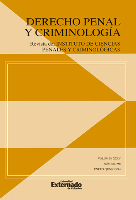
Derecho Penal y Criminologia
Empowering Minds with Open Access KnowledgeDerecho Penal y Criminología is a distinguished academic journal published by UNIV EXTERNADO COLOMBIA, dedicated to advancing the fields of criminal law and criminology. Since its inception in 1999, this Open Access journal has provided a platform for researchers, practitioners, and students to share innovative ideas, empirical studies, and critical analyses pertinent to contemporary issues in these fields. With a commitment to disseminating valuable research without barriers, the journal serves as an essential resource for those looking to deepen their understanding of criminal justice processes and criminological theories. Although the H-index and specific rankings remain to be detailed, the journal is positioned as a vital contributor to ongoing discussions and developments in penal law and criminology, making it a must-read for professionals seeking to engage with the latest scholarly work. The journal welcomes submissions and encourages robust dialogue among its readership in the quest for justice and effective legal reform.
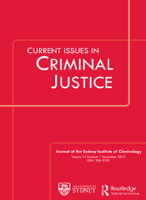
Current Issues in Criminal Justice
Exploring Contemporary Challenges in Criminal LawCurrent Issues in Criminal Justice is a leading academic journal aimed at advancing research in the field of criminal justice, published by Routledge Journals, Taylor & Francis Ltd. With an impressive Q1 ranking in Law and a Scopus rank of #129 out of 1025, placing it in the 87th percentile of its field, this journal is recognized for its significant contribution to scholarly discussion and policy analysis. Covering topics from legal systems, crime prevention, and contemporary justice challenges, Current Issues in Criminal Justice serves as a vital resource for researchers, practitioners, and students seeking to explore pressing issues and innovative solutions within the justice system. The journal's commitment to high-quality, peer-reviewed research ensures that it remains at the forefront of legal scholarship, fostering interdisciplinary dialogue and informing policy development in the United Kingdom and beyond. With access options tailored for academics and practitioners alike, this journal is essential for those invested in the future of criminal justice research.
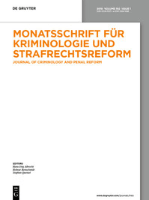
Monatsschrift fur Kriminologie und Strafrechtsreform
Exploring the Intersection of Crime and Reform.Monatsschrift für Kriminologie und Strafrechtsreform is a prestigious academic journal dedicated to advancing the fields of criminology and legal reform. Published by WALTER DE GRUYTER GMBH in Germany, this journal boasts a significant history since its inception in 1943, continually evolving its focus and scope from 2010 to 2024 to address contemporary issues in law and criminal justice. With an impressive Q2 rating in Law and a ranking in the 46th percentile among social sciences law journals, it serves as a vital resource for researchers, practitioners, and students alike. By publishing innovative articles, critical reviews, and comprehensive studies, the journal aims to foster academic discourse and propel discussions surrounding legislative reforms and criminological theories. Although it does not currently offer open access, readers can obtain valuable insights that contribute to both academic scholarship and practical applications in the legal field, thereby enhancing the understanding of complex societal dynamics related to crime and law enforcement.